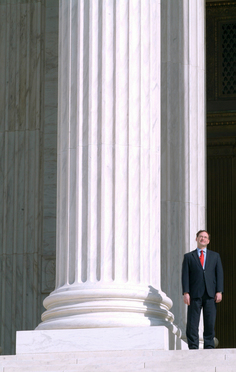APPEAL: “For the first time in our nation’s history, one House of Congress has been permitted to invoke the jurisdiction of the federal courts to resolve a disagreement between the political Branches arising out of the Executive Branch’s administration of a federal program,” U.S. Justice Department lawyers wrote in a court filing Monday night in Washington announcing the government’s intent to appeal the ruling that kept alive House Speaker John Boehner’s health care suit. Roll Call’s Todd Ruger has more here on the government’s push to take the case now to the U.S. Court of Appeals for the D.C. Circuit. The NLJ’s Mike Sacks has earlier coverage here on U.S. District Judge Rosemary’s Collyer’s ruling.
ALITO SPEAKS: U.S. Supreme Court Justice Samuel Alito Jr. spoke at a Federalist Society event on Saturday in Dallas, where he critiqued the court’s decision in last term’s Affordable Care Act case, Justices Stephen Breyer and Ruth Bader Ginsburg’s dissent in a death penalty case suggesting capital punishment may be unconstitutional, and the arguments the Solicitor General’s office has put forward on religious liberty and executive power during the Obama administration. The NLJ’s Tony Mauro has a recap here, and University of South Texas School of Law professor Josh Blackman, who was in attendance, has full coverage here. Lawrence Hurley of Reuters has a related story that says the high court isn’t likely to take up the constitutionality of the death penalty.
CLASS ACTION WANTED: Two proposed class actions in the Northern District of California take on Volkswagen over an alleged corporate scandal to make diesel-powered cars appear cleaner-running than they actually were. Read the complaints here and here. Meanwhile, from The Wall Street Journal’s Aruna Viswanatha: “The U.S. Justice Department is conducting a criminal probe of Volkswagen AG over the auto maker’s alleged cheating on U.S. emissions tests, people familiar with the matter said.” The New York Times has this story: It Took E.P.A. Pressure to Get VW to Admit Fault.
SUSPENDED: The Pennsylvania Supreme Court on Monday temporarily suspended the law license of the state’s Attorney General Kathleen Kane while the criminal case proceeds against her for perjury and obstruction of justice. “The order comes barely a month after Montgomery County authorities arrested Kane on Aug. 6 on charges she leaked secret investigative information to a newspaper reporter and then lied about it under oath. She had been motivated to publicly embarrass two former state prosecutors who had been publicly critical of her, prosecutors said,” the AP reports. NLJ affiliate The Legal Intelligencer has more.
CLINTON EMAILS: “Lawyers for the U.S. Department of State on Monday clashed with Gibson, Dunn & Crutcher partner Ted Olson, who recently accused the agency of disobeying court orders in a lawsuit over records related to Hillary Clinton’s tenure as secretary of state,” reports Zoe Tillman on the Blog of Legal Times. Olson, representing Citizens United, argued earlier against the State department’s request for more time to produce documents provided by former Clinton staffers Huma Abedin and Cheryl Mills. “Lawyers for the government bristled at Olson’s contention that the State Department should process documents produced by Abedin and Mills more quickly, given the speed at which “companies and law firms” conduct electronic discovery, wrote Tillman. “The Department of State is not a for-profit law firm whose clients are billed for services rendered and which can, therefore, expand its services whenever a client is willing to pay for it,” the State Department wrote in its brief.
FORGOTTEN IN FRANCE: Google lost its appeal before a French agency on Monday over the scope of the so-called “right to be forgotten” established last year by the top European Union court. France’s “data protection agency said that limiting the privacy decision to just domains in Europe could be easily bypassed by individuals based in the 28-member European Union, which would nullify the court’s privacy ruling. The watchdog also said that once Google had agreed to remove the links, the company was required to apply the decision across all of its domains, not just those in Europe,” reports Mark Scott for the New York Times.





